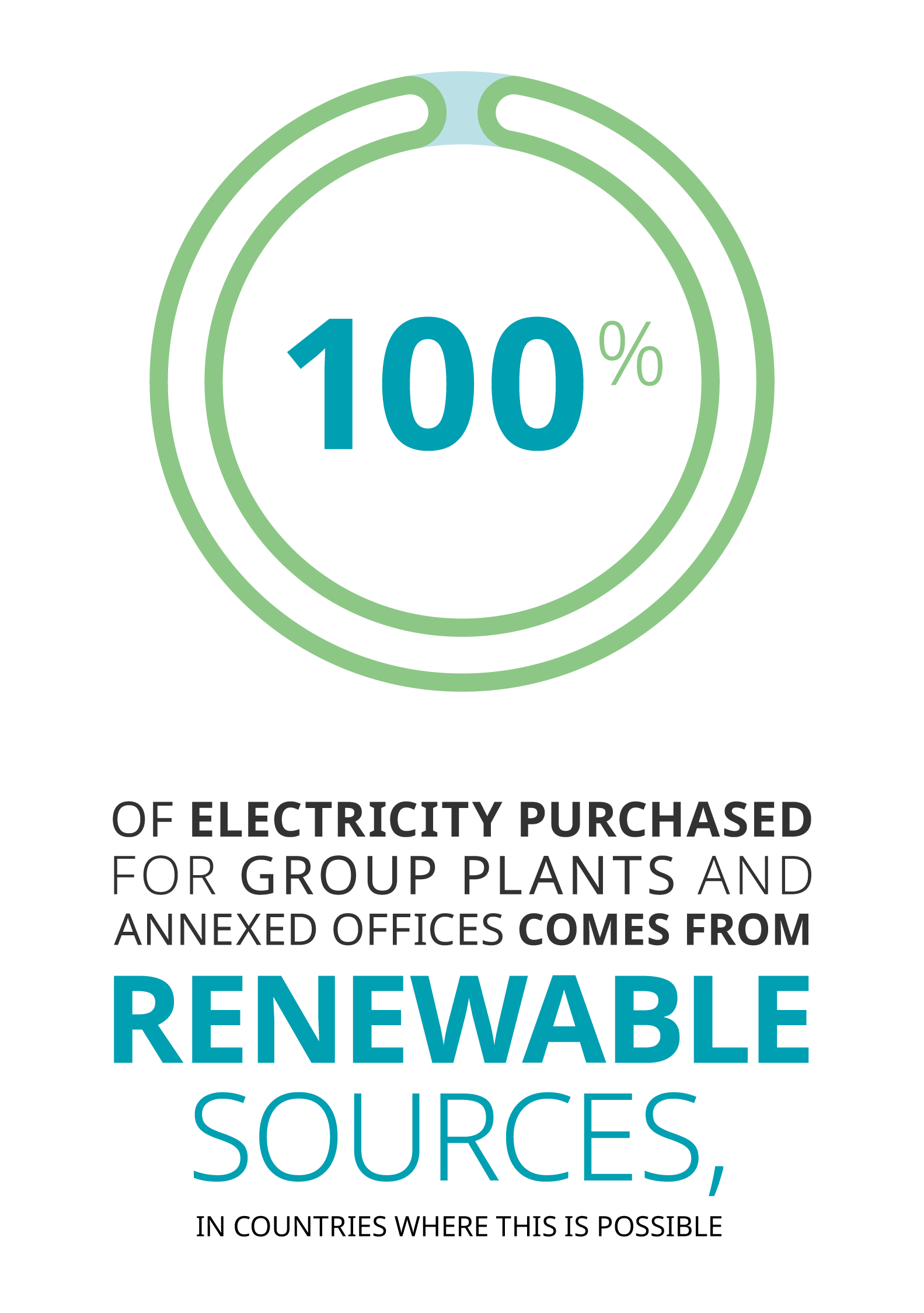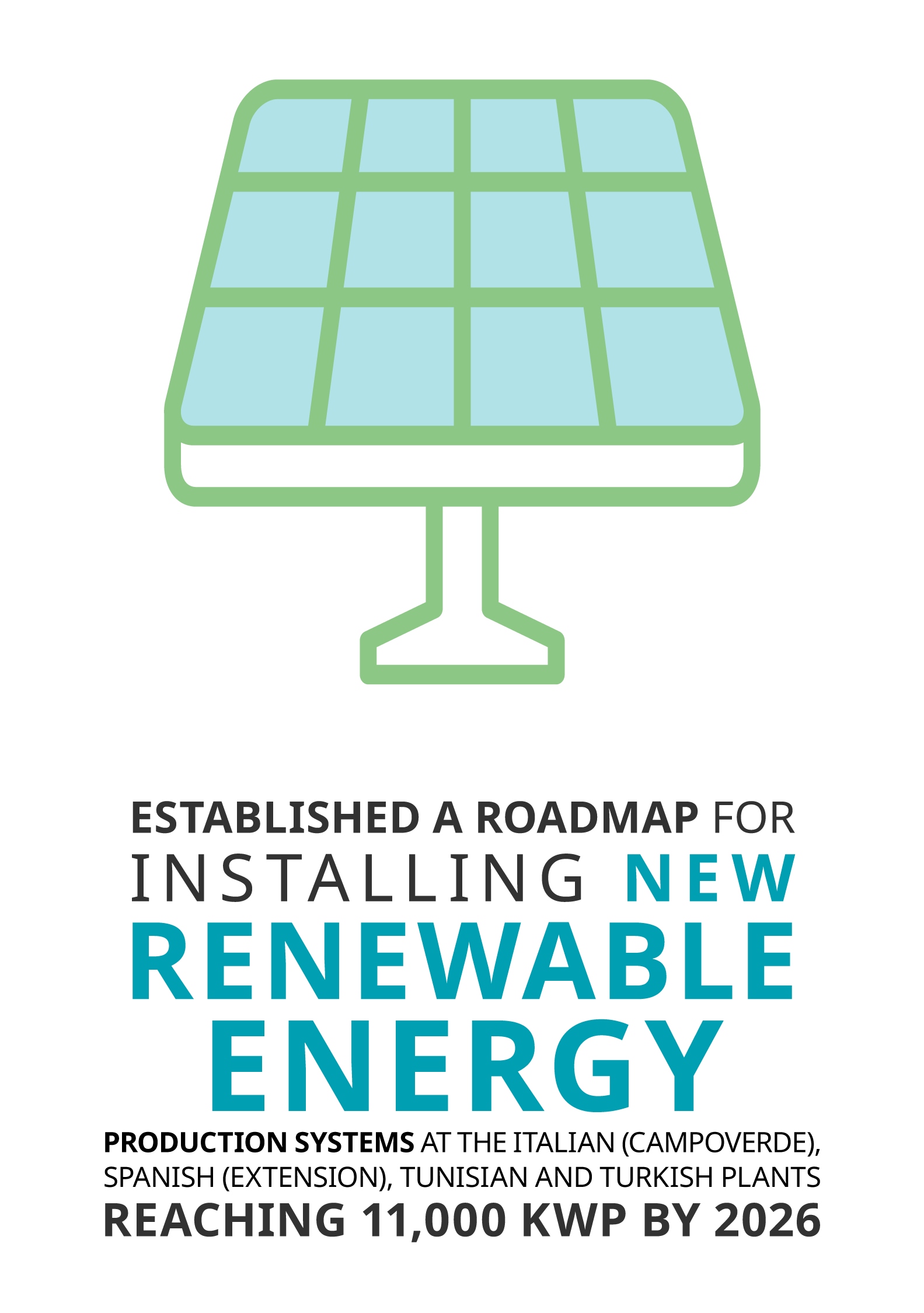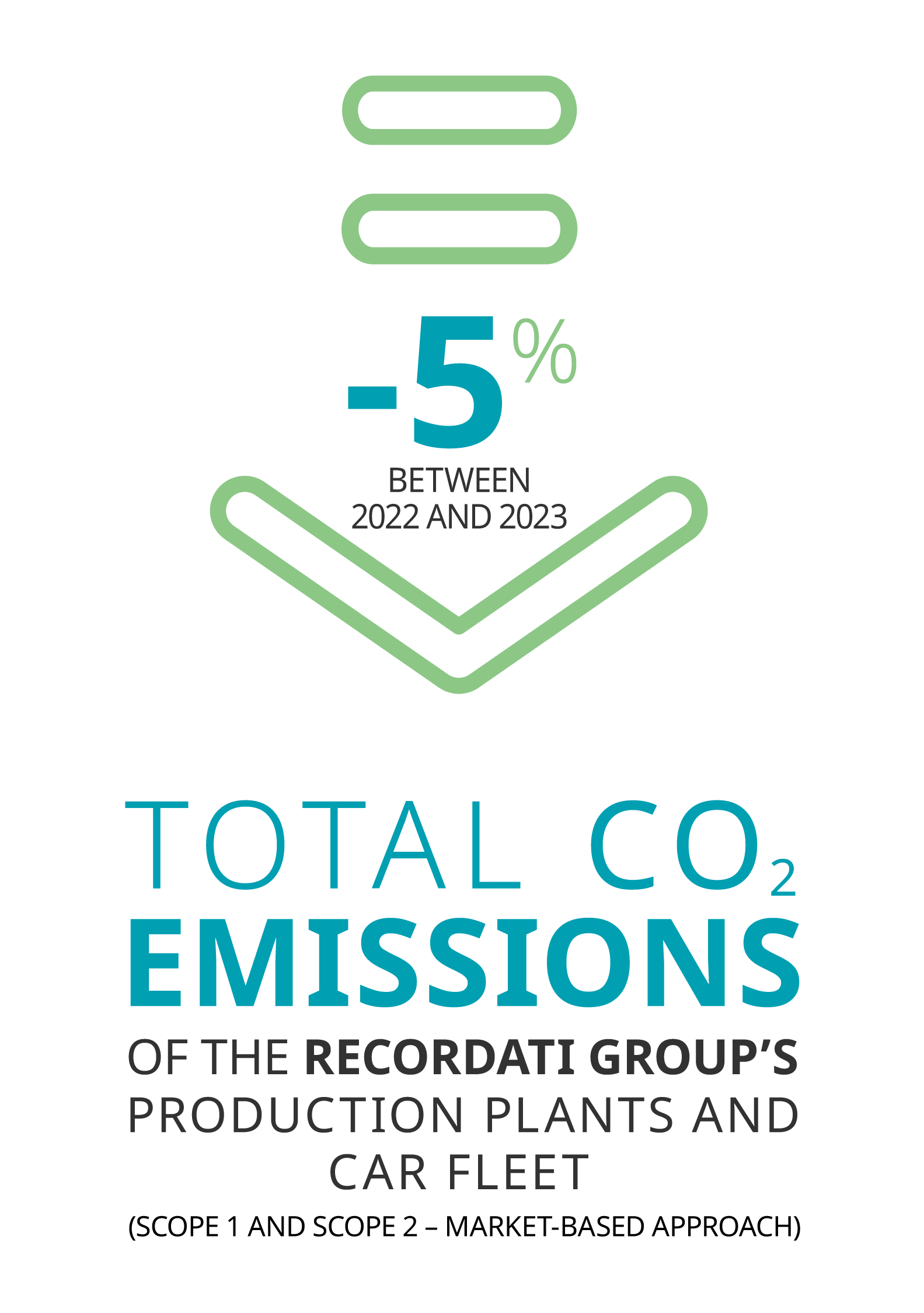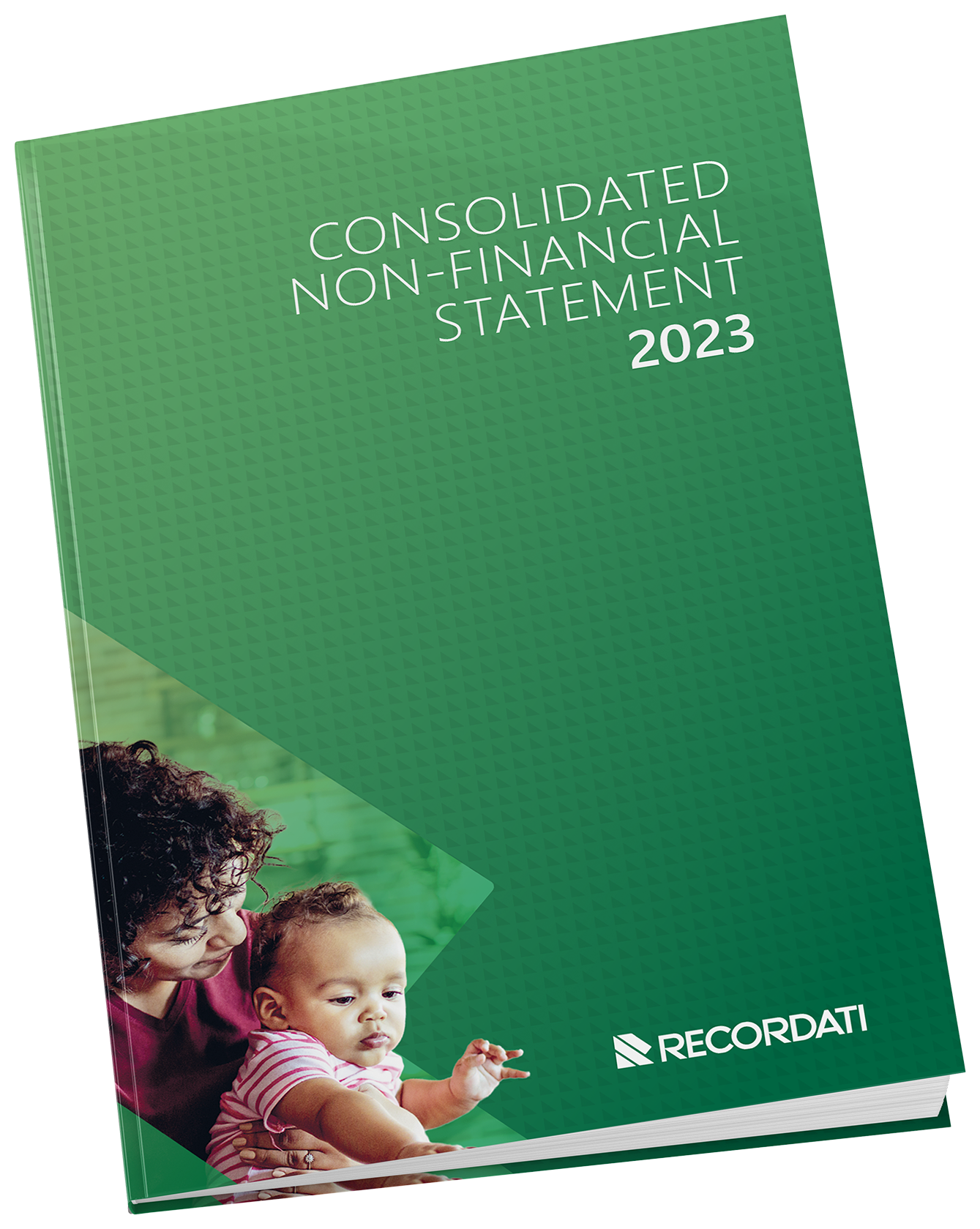Environmental Protection
A clean environment is essential for people’s well-being: the health of the planet and the health of people are interconnected. Environmental elements, such as air, water, land and climate, all have an impact on the well-being of humans. Placing a focus on people’s health and being sustainable therefore also means prioritising environmental protection and a responsibility towards future generations. This is why the Group ensures that it conducts business in a socially responsible manner and in accordance with sustainable practices, national and international laws, and the expectations of stakeholders.
As defined in the Group Code of Ethics, Recordati is committed to implementing policies aimed at increasing the environmental sustainability of the Company’s business and meeting all related legal and regulatory requirements. Everybody is required to respect the corporate procedures and standards in force and to report any deficiencies or failure to respect these in a timely fashion. In performance of its activities, the Group:
- uses advanced technologies for the purposes of environmental protection, energy efficiency, the sustainable use of resources, combating climate change and protecting our natural world and biodiversity;
- promotes initiatives in production plants aimed at minimising energy and water consumption and reducing the emission of greenhouse gases and other pollutants into the atmosphere
- is dedicated to reducing the production of waste linked to manufacturing activities, with a particular focus on correctly disposing of chemical and pharmaceutical products. Uses materials which can be recycled or disposed of in accordance with applicable regulations;
- promotes environmental protection by providing information and holding regular training courses, appointing officers responsible for compliance with environmental management issues, and by carrying out inspections and verifications of the conformity of manufacturing sites;
- provides regular information to stakeholders regarding its environmental commitment.
Principal initiatives to combat climate change implemented by the Recordati Group
Initiatives to purchase and produce renewable energy: as regards electricity, as part of Recordati’s constant focus on the environment and its commitment to reducing atmospheric emissions, the Group increased its procurement of electricity from renewable sources. In 2023, the target originally set for 2025 was achieved ahead of time. This target involved supplying all production sites with renewable energy, in countries where green energy is available. During the year, 100% of electricity purchased for Group plants and annexed offices came from renewable sources, in countries where this is possible (certified by Guarantees of Origin for European countries and I-REC for Türkiye)* .
* It is noted that 100% of the renewable electricity purchased is for Group manufacturing sites located in countries where it is available, and therefore with the exception of the Tunisian site. Considering Tunisian consumption in FY23, electricity from renewables purchased is approximately 90%. For full disclosure, it is noted that as regards the annexed offices of the plant, this excludes the purchase made for the offices in the Czech Republic, as the electricity contract for this specific area is included in the lease and thus is not regulated or managed directly by the Group. In any case, the impact on total electricity is negligible.
Furthermore, the Group is pursuing a series of initiatives aimed at installing renewable energy plants. In addition to the solar panels installed at the Spanish and Irish plants in 2022 (installed power capacity of 386 kWp generating approximately 10% of the electricity needed annually for the operations of each plant), the Group aims to install new renewable generation systems at the Italian (Campoverde), Spanish (expansion of systems), Tunisian and Turkish plants, reaching 11,000 kWp by 2026. It is estimated that this installed power corresponds to a theoretical generation capacity of approximately 15.1 GWh (around 26% of total Group electricity consumption in FY23, including self-generated electricity from the Campoverde co-generator used internally).
Incentivisation of eco-friendly vehicles: again, in 2023, the Group carried out a monitoring and control activity to assess the emissions of its global fleet of company vehicles. In 2023, approximately 2,000 company cars were in use by employees of the Recordati group. In order to lower the environmental impact of the company fleet, in 2022, a new Group Car Policy was issued which introduced a maximum limit on CO2 emissions for new cars in the company fleet. The number of charging stations for electric and hybrid vehicles was also increased at several sites, including the Italian site in Milan.

*This figure excludes Tunisia, where renewable energy is not available. Please refer to the 2023 Consolidated Non Financial Statement for further details.


Waste Management and Circular Economy
The Recordati group’s commitment to environmental protection is also evidenced by its activities to reduce the waste produced by its activities, the adoption of a circular approach, wherever possible, aimed at recovery and re-use, and the correct disposal of chemical and pharmaceutical products, particularly at its production sites.
Amongst the main initiatives under way at the Group plants for the management of waste and circular economics, it is noted that the Campoverde di Aprilia plant conducted analysis of various initiatives to recover and re-use chemical raw materials employed in production processes, such as benzaldehyde. More specifically, studies and tests were performed on residues from the distillation of toluene, classified as hazardous liquid waste. Further in-house quantitative analysis is under way and by 2024 it should be possible to recover and reuse benzaldehyde in production processes (it is estimated that at full capacity it will be possible to recover approximately 50% of the benzaldehyde used annually). In addition, since 2022 the Group has been able to recover at least 55% of the palladium used in all production processes. In 2023, through partnerships with third parties, the Group recovered approximately 7 kg of palladium, which can be re-used in the production process, minimising the use of new raw materials. The Group will continue to explore new initiatives for the recovery and reuse of chemical raw materials used in production processes. The recovered raw materials may be reintroduced into internal production processes or through partnership agreements with third-party companies.
